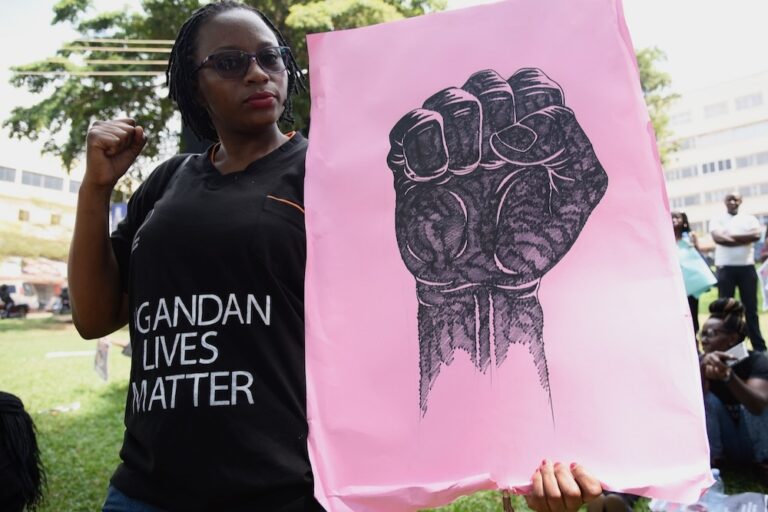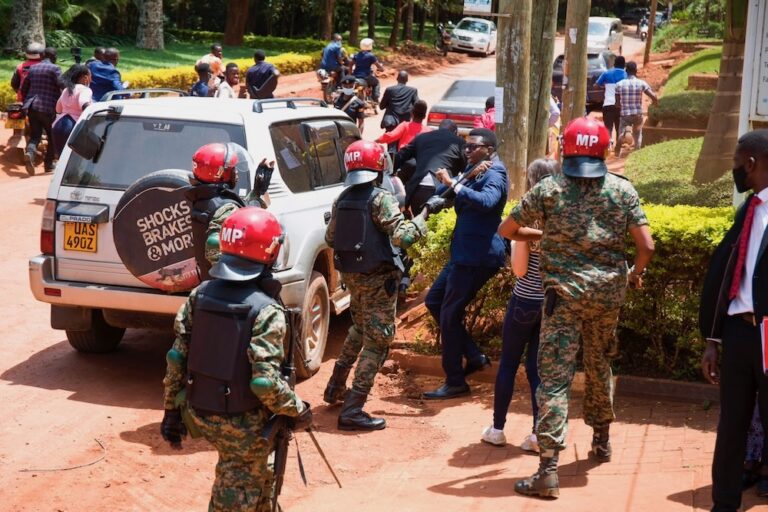(RSF/IFEX) – Reporters Without Borders has called on the Ugandan government to come to its senses after a week of police harassment of the independent “Daily Monitor” newspaper, culminating in a spectacular raid on its premises on the night of 17 November 2005, all of which were part of the government’s efforts to neutralise support […]
(RSF/IFEX) – Reporters Without Borders has called on the Ugandan government to come to its senses after a week of police harassment of the independent “Daily Monitor” newspaper, culminating in a spectacular raid on its premises on the night of 17 November 2005, all of which were part of the government’s efforts to neutralise support for imprisoned opposition leader Kizza Besigye.
“A night-time police raid on a newspaper and interception of its delivery trucks are despotic reflexes which the Ugandan government should abandon for good,” the press freedom organisation said. “The ‘Daily Monitor’ has often been targeted by the president and his ministers and it is now time to leave it in peace. Attacking the independent press during times of political unrest just makes things worse.”
Led by the police commissioner in charge of crime, Edison Mbiringi, around 20 armed police officers raided the building housing the “Daily Monitor” and Radio 93.3 KFM in the Namuwongo industrial district of Kampala shortly after 11 p.m. (local time) on 17 November, wanting to know who was responsible for posters that had just been put up in various parts of the city by the main opposition party, the Forum for Democratic Change (FDC).
The posters appeal for donations to an organisation for the defence of political prisoners named after the FDC’s leader, Besigye, who was arrested on charges of “treason” and “rape” upon his recent return from exile.
The police thought the newspaper’s staff should know who was responsible since they ran an identical half-page advertisement in their latest issue. Without explaining why, the police officers claimed that the newspaper needed police permission to publish such an announcement and that it had therefore broken the law. The newspaper’s staff disputed this and the police finally withdrew at around 1 a.m.
Shortly thereafter, the newspaper’s delivery trucks were stopped and inspected by police in various parts of the country, especially the west and the north, on the road to Entebbe international airport and in Besigye’s stronghold, the southwestern town of Rukungiri. The police also sealed off the newspaper’s local offices in Rukungiri and Kabale in order to seize copies as they were delivered. In the eastern town of Pallisa, police ordered a “Daily Monitor” representative not to distribute the newspaper. Distribution finally resumed after the newspaper’s management intervened.
The “Daily Monitor” was previously threatened with closure on 15 November after it carried a report claiming that President Yoweri Museveni originally chose his half-brother, Salim Saleh, as head of the armed forces before changing his mind. The newspaper had to publish a government denial to avoid “other measures” by the authorities.
The article’s author, star political journalist Andrew Mwenda, was arrested on 12 August and released on bail three days later because of comments he made on a Radio 93.3 KFM programme, which he hosts, about the death of Sudan’s former rebel leader John Garang in a helicopter crash. He still faces a possible five-year prison sentence on charges of sedition.


